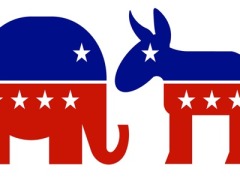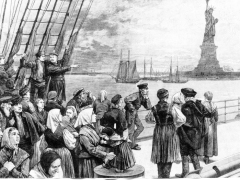In a surprise move, Aquinas bases the virtue of alms on the second human competence with material things, which is their use and enjoyment.
This is a continuation of my commentary on Thomas Aquinas’s views of private property in Article 2, Question 66 of Summa Theologiæ. ST II-II, 66, 2 [ST 2a2æ 66, 2]. The posts in sequence are: 1) Article 1 Text and Commentary 2) Article 2 Text and Prologue 3) Objection 1 to Private Property 4) On relationship of Natural Law and Human Law 5) Objection 2 to Private Property 6) Objection 3 to Private Property 7) Aquinas’s Views of Private Property 8) The First Human Competence: Care and Commerce 9) The Three Reasons Private Property is Necessary 10) The Second Human Competence 11) Reply to Objection 1: All Things in Common (this post) 12) Reply to Objection 2: Analogy of the Theater 12) Reply to Objection 3: Over consumption is robbery
The Second Human Competence
Let us know now turn to the second competence that Aquinas attributes to human beings with respect to material things.
The second thing that is competent to man with regard to external things is their use. In this respect man ought to possess external things, not as his own, but as common, so that, to wit, he is ready to communicate them to others in their need. Hence the Apostle says (1 Tim. 6:17,18): “Charge the rich of this world . . . to give easily, to communicate to others,” etc.
As noted earlier, Aquinas says that human are competent with respect to the use of external things. The Blackfriars translation understands this to refer to competence “to use and manage the world’s resources.” It may also refer to the enjoyment / consumption of material things. This means that humans are both capable and fit to make use of and enjoy things, such or example, using wood for houses or boats, and hides for leather. It is not entirely clear to me how sharply this competence differs from the first which was the power to procure and dispense things or what we called “care and commerce.”
What is more surprising is the conclusion that Aquinas draws from this competence. We might have expected Aquinas to conclude, as he did about the first competence, that this second competence proves it is lawful and licit to have private property. After all, that is what this second article is all about.
But not only does Aquinas not propose what might have been the expected conclusion but he seems to move in the opposite direction: The human competence of use proves that humans should possess external things, not just as their own personal property, but for the sake of the common! This is a surprising conclusion since the whole thrust of this article seemed to be that private property does not contradict the natural law, in which everything is in common. Now, the tables have been completely turned. One is to hold property privately on behalf of and for the commons.
If is as if to say that now that we have established the legitimacy of private property and its positive benefits, we must care for our goods for the sake of others. By doing so, one is ready to share with others in their time of need. Translations differ in emphasizing whether a person “ought to” possess external things for the sake of the commons or whether one “must” manage things in the interest of all. [1]Blackfriars translation is as follows: Man’s other competence is to use and manage the world’s resources. Now in regard to this, no man is entitled to manage things merely for himself, he must do … Continue reading. While it is permissible to have private property, one should or must possess things as if they are common and use them so one is ready to help those in need. Or to put it another way, one may have private property but not fully consume what one has without planning for the use of those in needs.
In a way, we have come full circle back to ideas of St. Basil, the parable of the rich fool, and the metaphor of the theater discussed in Article 1, Objection 2 and above in Article 2. Surplus is to be held for the commons and those in need. Use and possession is to be done in such a way that keeps an eye on the needs of all. As Aquinas makes clear in his discussion of alms, one takes care of oneself and one’s own first and then has a duty of alms (ST II-II, 32, 5).
One is reminded here of a similar argument that Aristotle had made that private property is necessary for some human virtues. Without property, for example, one cannot be generous or as Aristotle puts it, without private property, “it will not be possible to show oneself as liberal or to perform any liberal actions, since the function of liberality lies in the use of property” (Politics II.5.10 [1263b]). Thus for Aristotle, private property is necessary to fulfill certain virtues such as liberality and moderation and virtue is the end or goal of a life of flourishing.
While Aquinas has linked all of his reasons back to Aristotle, one still has that sense that his argument moves in a different thought world. This is a topic that will take us beyond the current commentary and to which I hope to return. Briefly, Aristotle does not sharply distinguish between the justification of property’s legitimacy and the moral duty of alms or the virtue of liberality. All are mixed together in a justification of property’s goodness. Aquinas, by contrast, Aquinas has more sharply separated those reasons justifying property’s necessity and lawfulness from the reasons justifying the moral relationship to things. It is a subtle distinction but one that is palpable.
In any case, Aquinas concludes his discussion of this second human competence by citing the instructions of the Apostle Paul to his young protégé Timothy(1 Tim 6:17-18) which charges the rich to be generous:
17 Command those who are rich in this present world not to be arrogant nor to put their hope in wealth, which is so uncertain, but to put their hope in God, who richly provides us with everything for our enjoyment. 18 Command them to do good, to be rich in good deeds, and to be generous and willing to share. 19 In this way they will lay up treasure for themselves as a firm foundation for the coming age, so that they may take hold of the life that is truly life.
Aquinas does not cite the larger context of the above quote which, like the parable of the rich fool (Luke 12: xxx), is another example of early Christianity’s deep ambivalence about material goods. By citing the above verses only, and by linking them to his position that generosity and care for the needy sits on top of the basic lawfulness of property, Aquinas neutralizes what often appears to be a more critical view of material wealth. Here is the full passage which has the more critical sentiments.[2]https://www.biblegateway.com/passage/?search=1%20Timothy%206
6 But godliness with contentment is great gain. 7 For we brought nothing into the world, and we can take nothing out of it. 8 But if we have food and clothing, we will be content with that. 9 Those who want to get rich fall into temptation and a trap and into many foolish and harmful desires that plunge people into ruin and destruction. 10 For the love of money is a root of all kinds of evil. Some people, eager for money, have wandered from the faith and pierced themselves with many griefs.
11 But you, man of God, flee from all this, and pursue righteousness, godliness, faith, love, endurance and gentleness. 12 Fight the good fight of the faith. Take hold of the eternal life to which you were called when you made your good confession in the presence of many witnesses. 13 In the sight of God, who gives life to everything, and of Christ Jesus, who while testifying before Pontius Pilate made the good confession, I charge you 14 to keep this command without spot or blame until the appearing of our Lord Jesus Christ, 15 which God will bring about in his own time—God, the blessed and only Ruler, the King of kings and Lord of lords, 16 who alone is immortal and who lives in unapproachable light, whom no one has seen or can see. To him be honor and might forever. Amen.
Having now concluded discussing his own views of property, Aquinas turns back to the three objections raised earlier against private property and answers them. It is to this topic that we now turn.
References
| ↑1 | Blackfriars translation is as follows: Man’s other competence is to use and manage the world’s resources. Now in regard to this, no man is entitled to manage things merely for himself, he must do so in the interest of all, so that he is ready to share with them with others in case of necessity. Blackfriars, Vol. 38, p. 69 |
|---|---|
| ↑2 | https://www.biblegateway.com/passage/?search=1%20Timothy%206 |




